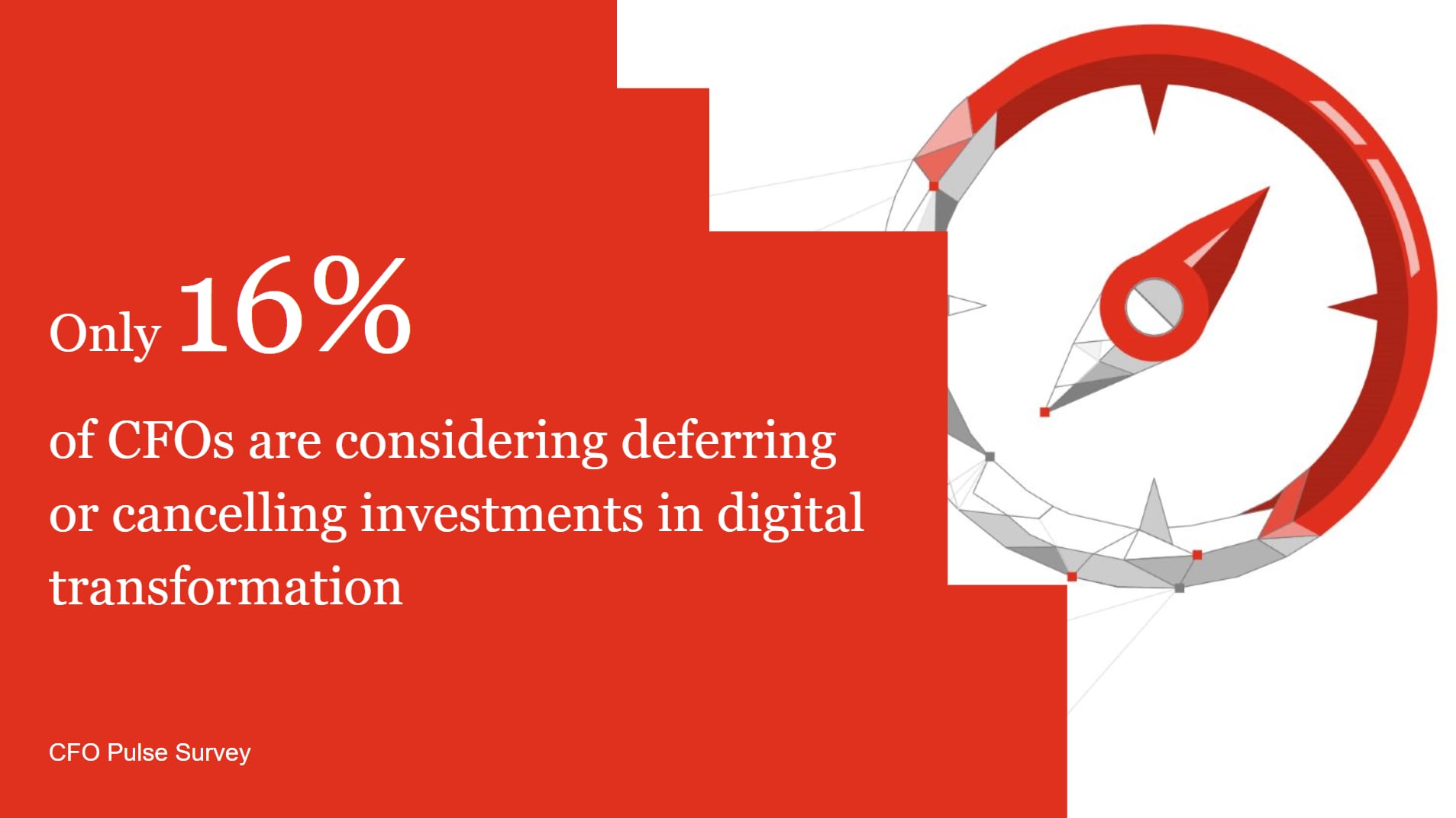
Citizens in Central and Eastern Europe (CEE) are demanding more from their governments and expect public services to be accessible at all times, in all places. This pressure to ‘go digital’ heightened with the outbreak of COVID-19, as digital infrastructure became essential to maintain business continuity.
PwC’s CFO Pulse survey reveals that 60% of finance leaders from around the world say they will defer or cancel planned investments in response to the ongoing COVID-19 pandemic. But only 16% of CFOs are considering deferring or cancelling investments in digital transformation.
The pandemic has only further emphasised the need for digital transformation. Resilient futures depend on technology investments and new skills.

As a region, CEE has seen impressive progress in the modernisation and adaptation of technological innovations. Countries like Estonia are paving the way for successful digital public services. But the region’s average digital maturity level is behind our European counterparts. According to the European Commission’s eGovernment Benchmark 2019, the CEE region lags behind in all top-level benchmarks (user centricity, transparency, cross border mobility, key enablers) with an average of 59%, compared to the EU average of 69%. We discuss possible approaches to building citizen-centric services models and financing opportunities in the report Citizens at the centre: Building digital public services in CEE.

But in addition to technology, people themselves are equally important to digital transformation.
PwC estimates that 34% of public sector jobs are at risk of being replaced by automation by the early 2030s. This is where upskilling can help. Governments need to start preparing their workforce for the jobs of the future. Especially as we enter the stabilisation and recovery phases of the crisis and the new normal takes shape, the labour market needs to become more agile and resilient to future shocks.
We’re committed to preparing both our own people and our clients’ workforce for the digital age as part of PwC’s New world. New skills initiative.
PwC’s Academy, our dedicated client training business, helps organisations and individuals build the critical skills required to stay relevant in the digital economy.
We sat down with Branka Modrusan of PwC’s Academy to discuss the importance of upskilling the public sector throughout CEE.
Has the pandemic had an impact on the importance of digital upskilling for organisations in our region, particularly for governments?
Definitely – it accelerated ongoing projects and proved the importance of embracing digital technologies in both private and professional lives.
The public sector in particular is under pressure to automate its processes because we are likely to see a prolonged surge in inquiries and benefit claims from businesses and citizens. In times of uncertainty, people require more disclosure and information in real time, and are looking to governments to be that reliable source of guidance. And then there’s the effects of social distancing. People will be less inclined to make multiple in-person visits to various governmental agencies and will expect to have the possibility to manage their affairs remotely. All of this is putting pressure on public sector institutions to strengthen their online delivery channels, and automate data collection and processing capabilities.
But technologies alone can’t make the public sector more efficient.
Their potential depends on the skills of the people using them. So, any efforts to make the public sector more citizen-centric inevitably have to include upskilling across all organisational levels: frontline workers need better communication and problem resolution skills, back office staff require data analysis and collaboration capabilities, and senior management need stronger creative thinking and change management skills.
Since the outbreak of COVID-19, we are already seeing the prioritisation of these skills throughout the region. For example, international donors such as the World Bank and EBRD have made an increase in funding available to CEE governments for projects focused on digital upskilling of public sector workers and those who have been hardest hit by the pandemic: the self-employed and small business owners.
What can governments do to help foster successful digital upskilling – either for people working in the public sector or in society as a whole?
Governments should step up their efforts to help more people reap the benefits of digital transformation and reduce the risk of widening social inequalities. We know from prior industrial revolutions that – while on the whole societies do become more prosperous – those who are slow to adapt or lack access to resources risk becoming economically marginalised.
Creating opportunities for lifelong learning will be key.
In this respect, Singapore is a great example of how a government can foster a culture of lifelong learning on a national level. Five years ago, the Singapore Government launched an online portal that provides citizens with the resources to support their training and career needs throughout life. All Singaporeans aged 25 and above receive a ‘learning credit’ that can be used on approved training courses. The portal connects all three key stakeholder groups: individuals apprehensive about their future career prospects; employers struggling to find talent; and, academic institutions and training providers keen to offer training aligned to the needs of their learners. In partnership with employers, industry associations and trade unions, a comprehensive Skills Framework was created for thousands of jobs across all sectors of Singaporean economy. This allows job seekers to compare their current skill set with desired skills profiles and work on closing the gap in their own time and at their own pace by taking online courses in topics such as data analytics, cybersecurity, digital media and entrepreneurship.
Creating opportunities for lifelong learning will be key.
The public sector also plays an important role in securing equal access to learning for society as a whole. Using the new tools to communicate with citizens and improve the efficiency of their services isn’t enough; they also have to mitigate the unintended consequences that accompany digital transformation.
Tapping into people’s personal motivations for learning will also be important.
People opt in when the expected benefits are greater than the investment of their time and energy. By developing digital skills, people become more valuable not only to their current employer but any future employers as well. One way to encourage participation is to complement hard and soft skills training with courses dedicated to mental wellbeing, physical vitality, self-esteem and other self-efficacy skills, since the benefits carry over into personal lives. Incentivising employees to create their own mini-trainings on topics they are passionate about or to partake in peer-to-peer coaching and mentoring schemes is another way to stimulate a growth mindset and encourage a sense of accountability for one’s own development.
The public sector also plays an important role in securing equal access to learning for society as a whole. Using the new tools to communicate with citizens and improve the efficiency of their services isn’t enough; they also have to mitigate the unintended consequences that accompany digital transformation. Governments should make sure their advancements don’t in turn leave people, like the elderly and most marginalised, behind due to infrastructure or educational limitations. Affordable access to digital networks should accompany any advances in e-government services to minimise further disparities.
Have you seen any notable successes of digital upskilling in CEE’s public sector?
While CEE is lagging behind European counterparts in digital maturity overall, we also have some standout countries making great strides in their digital journeys.



Over the past two decades, Estonia has been a frontrunner in digitising governmental services. Every Estonian has a digital ID card, which provides digital access to Estonia’s e-services such as submitting tax returns, ordering medical prescriptions or voting. Education has been a big part of the government’s approach to creating digital society, and today Estonia boasts twice as many students pursuing IT careers than the OECD average. In 2017, PwC supported the government in creating a competency framework for civil service executives. It defines a successful civil service leader in Estonia as a “bold designer of the future, an achiever, an inspiring driver of innovation, a genuine value builder for target groups and an effective self leader”.
When many citizens had to switch their daily work and activities online almost overnight in response to the COVID-19 outbreak, the need for upskilling was clearly escalated. Teachers, for example, had to create digital lesson plans and keep their students engaged from afar. Our Customer Technology (CTech) team in Poland carried out a pilot project to support the implementation of digital tools for remote teaching at the 84th primary school in Wrocław. PwC coached designated trainers as part of the train-the-trainer initiative, which enabled knowledge sharing and mutual learning within the school’s staff. These qualified trainers can now support their colleagues in their upskilling journeys. Thanks to CTech’s support, the school can now plan and hold meetings, conduct conversations in a chat format, prepare and distribute documents, commission tasks and track their performance all online.
Beyond remote teaching during the crisis, projects like this create the foundation for efficient and flexible access to education in the long term.
Even before the pandemic, countries in CEE were taking steps to upskill their citizens. Take Slovakia, for example. The Slovak government set out to assess the current level of digital readiness of small and medium-sized enterprises (SMEs). PwC Slovakia, in cooperation with the European Commission, supported the government in a project funded by the EU’s Structural Reform Support Programme, to analyse the availability of skills for digital transformation, identify the sectors with the greatest need for specialised digital know-how and compare Slovakia’s approach to digitalisation with good practices from some of the EU’s digital leaders. Based on our findings, we designed policy recommendations for piloting and implementation of a national upskilling programme to support Slovak SME companies and their employees in developing the skills and mindset for the digital age. Even though the project hasn’t been implemented yet, the initiative shows the government’s commitment to preparing citizens for the digital future.
Finally, it’s important to say that upskilling is not just a theoretical framework for us. Over the past couple of years, we have accelerated our efforts to upskill our own workforce. We have invested in learning applications and immersive training programmes for our people to develop design thinking, data analysis, visualisation and automation skills.
From our experience internally and in working with clients, one thing is certain: adaptability and learning mindset will be the key for navigating the changes ahead.
Contact us
CEE Director of Brand and Communications, Warsaw, PwC Central and Eastern Europe
+48 519 506 633


